2024
74th Berlin International Film Festival
February 15 - 25, 2024
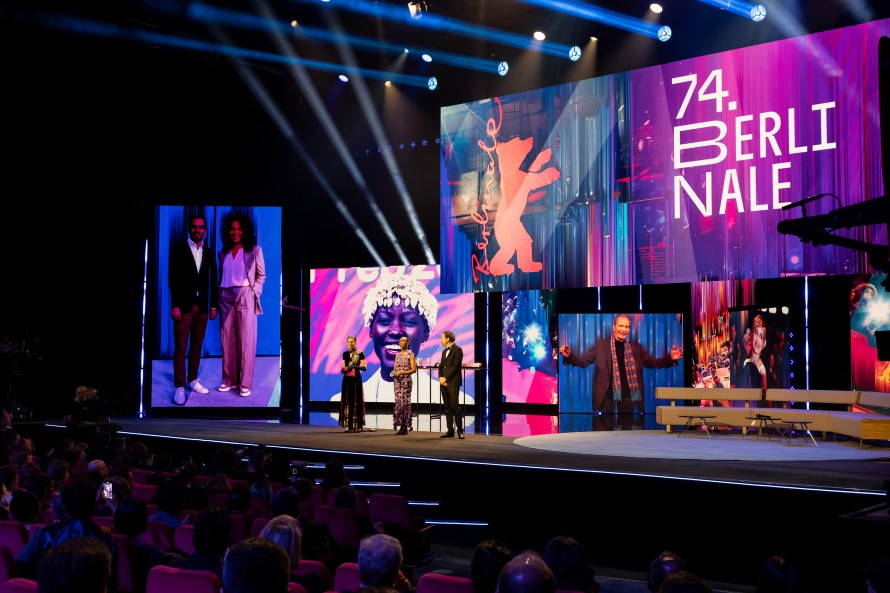
Best of Berlinale 2024
“It would have been exciting to witness which direction the development of the Berlinale could have taken if the new management duo had been granted a few years in a stable operating environment.”
Anna Edelmann and Thomas Willmann, “artechock.de”, March 7, 2024
After two exhausting years in 2021 and 2022 dominated by the corona pandemic, the 2023 edition ended with the festival apparently having returned to calmer waters. This impression, however, turned out to be deceptive. The period up to and well beyond the 2024 Berlinale was marked by a series of crises and conflicts which once again presented the festival’s management team with enormous challenges. The fact that during this tense situation they succeeded in putting into practice the fundamental idea of the Berlinale as a place of freedom of expression, respectful exchanges and discourse almost went unnoticed in the face of an overheated media landscape and an increasingly polarised political debate.
Funding
Mariëtte Rissenbeek and Carlo Chatrian had to focus on financing issues until the summer of 2023. Due to the high inflation relating to the war in Ukraine, among other things, and the increasingly challenging search for sponsors in cultural circles, they were left with no other choice than to make structural changes to the programme. Perspektive Deutsches Kino and Berlinale Series were discontinued. Serial storytelling and up-and-coming German filmmakers would find their places within the other sections. The total number of films was reduced again: in July, the number mentioned was 200, although 243 works were ultimately screened (by way of comparison: in 2019, the final Kosslick year, the figure still stood at 400). Of the remaining sections, the Homage was particularly affected, being represented by just a single film in 2024. There was some unhappiness about this new concept, especially in Germany, with concerns that the festival would be reduced to insignificance. However, the anticipated outcry never materialised since the decrease ultimately also offered the chance finally to be able to present the kind of condensed, focused programme for which many – and not just critics - had been yearning for years.

One last Berlinale together: Managing Director Mariëtte Rissenbeek and Artistic Director Carlo Chatrian
Controversial Developments
The beginning of September 2023 then saw a veritable commotion. A press release from Claudia Roth, the Federal Government Commissioner for Culture and the Media, dated August 31, 2023, announced that “the Supervisory Board of the Kulturveranstaltungen des Bundes in Berlin (KBB) GmbH, chaired by the Minister of State for Culture, decided at its meeting on August 31, 2023 to reshape the Berlinale’s management structure.” This news was not entirely a surprise since the Minister of State had already announced a review of the festival’s governance structure in March 2023.
Mariëtte Rissenbeek had stated in March 2023 that she would not be extending her contract. At first, the future position of the Artistic Director, whose contract would likewise expire at the end of the 74th Berlinale, remained unclear. While the Federal Cultural Ministry initially said that Carlo Chatrian wished to enter into “constructive discussions with the new management about a future role in the new Berlinale team”, the Artistic Director later wrote a personal statement in reaction to a miscommunication with Claudia Roth whose office provides a large part of the festival’s funding: “I thought that continuity could be facilitated if I remained part of the festival, but, in the new structure as it has been presented, it is quite clear that the conditions for me to continue as Artistic Director no longer exist.”
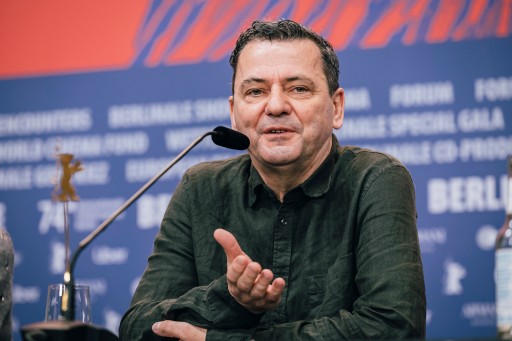
Christian Petzold, one of the signatories of the open letter and member of the 2024 International Jury
He received support from a number of well-known filmmakers that caused quite a stir, with an open letter published online stating: “We, a diverse group of filmmakers from all over the world, who have deep respect for Berlin International Film Festival as a place for great cinema of all kinds, protest the harmful, unprofessional, and immoral behavior of state minister Claudia Roth in forcing the esteemed Artistic Director Carlo Chatrian to step down despite promises to prolong his contract” (quoted by Elsa Keslassy and Naman Ramachandran in “Variety”, September 6, 2023). The list of signatories included names that would prove to be important to the festival the following February, most prominently those of Martin Scorsese, winner of the Honorary Golden Bear at the 74th Berlinale, and Christian Petzold, a member of the 2024 International Jury. The letter failed to change Roth’s mind, however, and she commissioned a search committee to look for suitable candidates to replace the joint directors. In mid-December 2023, to the almost universally positive surprise of commentators, Roth presented the American Tricia Tuttle as the new Festival Director. After five years in office, the Rissenbeek/Chatrian era would come to an end after the 74th Berlinale.
Calamities
To add to matters, the festival was stricken by global political crises. The events of October 7, 2023 would frequently bring this edition of the Berlinale into the media crossfire right to the festival’s conclusion and beyond. That was the day that saw a brutal attack by Hamas on Israeli territory. The terrorist organisation carried out a massacre against civilians and also took hundreds of people hostage. Israel’s swift and harsh retaliation triggered a humanitarian catastrophe in Gaza. The festival came under immense pressure from all sides to take a stance. The Berlinale thus ended up in an untenable position: any expression of solidarity in this toxic situation meant exposing itself to the hatred and hostility of one of the many parties involved. The expectations of politically active people and others who, due to Germany’s past, demanded unwavering loyalty to Israel in its current situation, clashed with those of creative artists, many of whom were urging solidarity with the Palestinians. In this charged atmosphere, a considered centre ground had almost no chance of being heard. In the period that followed, open letters and calls for a boycott led to an almost hysterical mood, continually fuelled by social media, parts of which had already been developing into engines of radicalisation and, above all, outrage for years. The festival management remained steadfast, refusing to be drawn to either side and insisting on the idea of the Berlinale and cinema as places of peaceful exchanges and dialogue. They extended their sympathy to all victims of war and violence; the films and programme should speak for themselves.

„MOVIES UNITE, HATE DIVIDES“ - button for the 74th Berlinale
Disinvitations
The next media storm ensued when the festival management decided to cancel the invitations to the opening gala for members of the AfD parliamentary group. During the previous few weeks and months, it had become clear – particularly by the revelation from the CORRECTIV journalist collective of a meeting in Potsdam between AfD party members and one of the heads of the openly right-wing extremist Identitarian movement – that the party is incompatible with the inalienable fundamental values of the Berlinale. Following the Potsdam meeting, hundreds of thousands of people took to the streets across Germany in support of democracy and to protest against exclusion. The silent majority raised its voice. This constituted a change in public mood that the festival could not ignore. And yet, cancelling the invitations required a great deal of courage because it challenged the traditional adherence to political procedures: it had become customary to allot a certain quota of tickets to democratically elected parties – including the Alternative für Deutschland – whose representatives sit on cultural committees and in the Berlin House of Representatives. But the festival took a stand: “Demands for a homogeneous society, immigration restrictions and mass deportations, homophobic, queer-hostile and racist remarks, as well as severe historical revisionism and outright right-wing extremism – can be found at the AfD,” the festival management stated in a press release. At the opening gala, Mariëtte Rissenbeek emphasised: “Hate is not on our guest list.”
“By the way, there’s also films”
After such a run-up, “Der Spiegel” heralded the start of the festival on February 15, 2024 with the headline: “By the way, there’s also films”. Following a barrage of questions regarding the global political situation, a visibly annoyed Christian Petzold said at the International Jury Press Conference: “When artists talk about Gaza and […] then about Ukraine, then about five AfD nonentities, that leads me to think at some point … we’re actually here to watch films.” Andreas Kilb commented in the “Frankfurter Allgemeine Zeitung”: “Art, including cinematic art, has become the arena for controversies that are not about culture, but about imperialism, anti-Semitism and other ideologies” (February 17, 2024). At times, the red carpet for the opening gala resembled a parade of political slogans. There was a commemoration of the 2020 racist attack in Hanau, a human chain holding lights and chanting “Defend Democracy” into the night air and the jury for the GWFF Best First Feature Award calling for “CEASEFIRE NOW”.
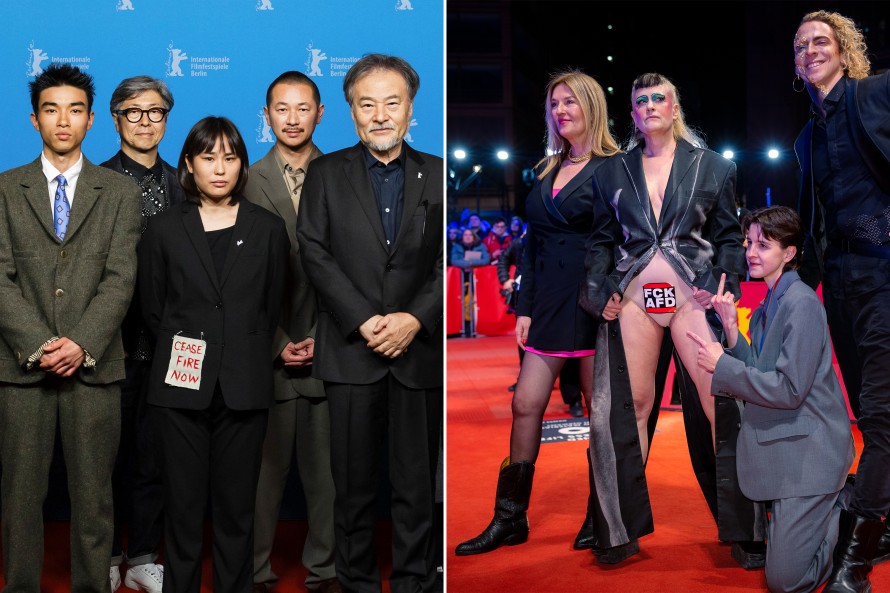
Subtle and less subtle demands presented during the festival days: the teams of August My Heaven and Chime at the Photo Call, the team of Teaches of Peaches on the Red Carpet
Successful Festival Days
After this, at times, overburdened opening, the days of the festival itself, proceeded relatively quietly until the grand finale of the awards ceremony, with only a few people conveying their messages – sometimes subtly, sometimes less so – to the audience.
A highlight of this edition was the presentation of the Honorary Golden Bear to the legendary director Martin Scorsese. As in the previous year, when Steven Spielberg enchanted the Press Conference audience, the journalists in 2024 quickly became fans: “[Scorsese’s] every sentence was a flash of inspiration, even festival director Carlo Chatrian and Kinemathek director Rainer Rother next to him could hardly keep up” (Christiane Peitz, “Der Tagesspiegel”, February 21, 2024). Bursting with energy, the 81-year-old filmmaker discussed the vitality of cinema and the significance of the Berlinale for his own career and those of his colleagues. That evening, Scorsese was celebrated as enthusiastically on the Red Carpet as during the gala in the Berlinale Palast that followed.
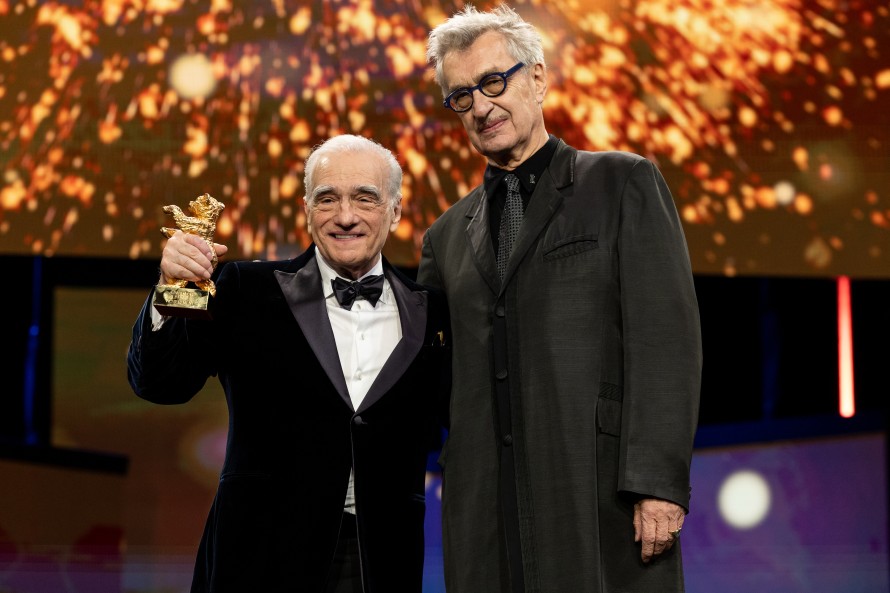
One of the highlights of the 74th Berlinale: Martin Scorsese received the Honorary Golden Bear, Wim Wenders delivered the laudatory speech
In general, anyone looking around in the cinemas during the days of the festival was unable to feel anything of the Berlinale crisis that was omnipresent in the media. The auditoria were packed, the atmosphere peaceful, the exchanges fruitful. And at long last, the level-headed voices had their say, as Tim Caspar Boehme observed: “At the premiere of his film Shikun, Israeli director Amos Gitai found himself faced with a request from an audience member that he ask the Minister of State for Culture, Claudia Roth, to convince the German federal government to sever their diplomatic relations with Netanyahu’s government. To which the director confidently replied that he was a trained architect and more interested in building bridges than demolishing them” (“taz”, February 26, 2024). In the end, pro-Palestinian activists only unfurled banners and chanted slogans at the European Film Market in the Gropius Bau. Large protests like those seen at IDFA in November and the Sundance Festival in January failed to materialise.

Saoirse Ronan, leading actor in Nora Fingscheidt's The Outrun, with fans at the Zoo Palast
Panorama featured gems such as Nora Fingscheidt’s The Outrun with Saoirse Ronan and discoveries such as Dag Johan Haugerud’s Sex in which two Norwegian chimney sweeps begin to question their “normality”. Barbara Wurm had a successful debut as the new head of the Forum. The “distinguished cinephiles’ gasp of horror” (Leonard Krähmer, “cargo.de”, March 6, 2024) which afflicted some hard-core Forum fans following Wurm’s announcement that the section would now be more open to popular forms was quickly assuaged by a glance at the selection. “Everything is still there […]. The spectrum has only expanded in directions […] which were not necessarily foreseeable, even if they are not arising from completely new but instead already traced lines of the not-exactly-narrow Forum tradition” (Leonard Krähmer, “cargo.de”, March 6, 2024). Moreover, following the long-standing Christine Troestrum’s farewell to the festival in 2023, Nikola Joetze made her successful debut as the new Project Manager of Berlinale Talents alongside Florian Weghorn. With the title of “Common Tongues – Speaking Out in the Language of Cinema”, the Talents deliberately set a counterpoint to the advancing schisms within society.
A Final Chatrian Competition
The assessment of the Competition turned out to be – almost compulsorily – ambivalent. Chatrian’s great love of smaller, more obscure films was on the one hand applauded and on the other judged to be a deficit. While September’s open letter in his defence had stated: “Carlo Chatrian may not be a showman but in his quiet ways, he and his team have chosen an open and artistically rewarding curatorial path, showing new directions in world cinema, challenging stereotypes, and connecting different strands of filmmaking”, Melanie Goodfellow and Andreas Wiseman wrote in their summary of the Artistic Director’s era: “Chatrian himself has a loyal following among hardcore arthouse fans, but sales and distribution professionals have been less impressed, saying the selection has veered too far from the market and the types of indie films that stand a chance in cinemas” (“deadline”, February 23, 2024). In addition, as in previous years, Chatrian’s habit of not explaining his selection and instead relying on the audience’s perceptions divided opinions. As Andreas Scheiner noted in the “Neue Zürcher Zeitung”: “Even in his last year as artistic director, Carlo Chatrian programmed a competition that required some work on the part of the audience. It’s good that the Berlinale trusts its audience to do this. But the films often get bogged down in their own intellectuality” (February 2, 2024).
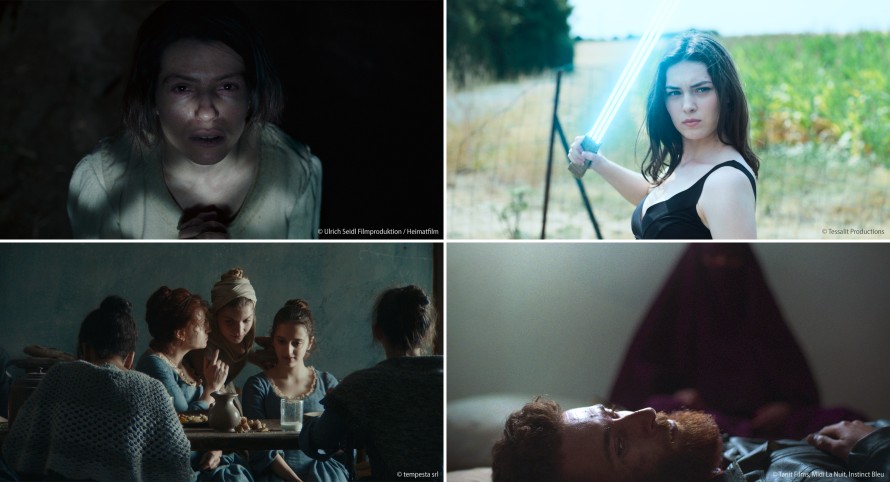
A variety of forms and films that played with elements of genres in the Competition: Des Teufels Bad by Veronika Franz & Severin Fiala, L’ Empire by Bruno Dumont, Gloria! by Margherita Vicario, Mé el Aïn by Meryam Joobeur
In fact, the Competition once again presented an immense variety of forms: films that played with elements of genres such as horror and science fiction, documentary works, a musical … A frequent criticism was that the individual films barely communicated with each other and that there was no discernible curatorial line: “The Competition seemed completely disparate – competitors which are not only playing in different leagues but are pursuing entirely different sports” (Anna Edelmann and Thomas Willmann, “artechock.de”, March 7, 2024). But there were also some positive voices: “The 2024 edition demonstrated once again what is possible for the Berlinale: some established filmmakers blended with aspiring, ambitious newcomers, a stable number of stars and the opportunity for works from less familiar countries. Considering these terms of reference, the last five Competitions will be remembered as strong to outstanding,” commented Marius Nobach in “Filmdienst” (March 14, 2024). However, what even Nobach hinted at in his appraisal was the old, oft-heard demand for more glamour à la Cannes and Venice. In 2024, only the opening film Small Things Like These by Tim Mielants - starring Cillian Murphy who would win an Oscar a month after this Berlinale for his role in Christopher Nolan’s Oppenheimer - was able to unleash a certain amount of star power in the Competition. The big celebrities could instead be found in the Berlinale Special where luminaries including Kristen Stewart, Adam Sandler, Masatoshi Nagase, Amanda Seyfried, Don Lee and Hunter Schafer made their star appearances.
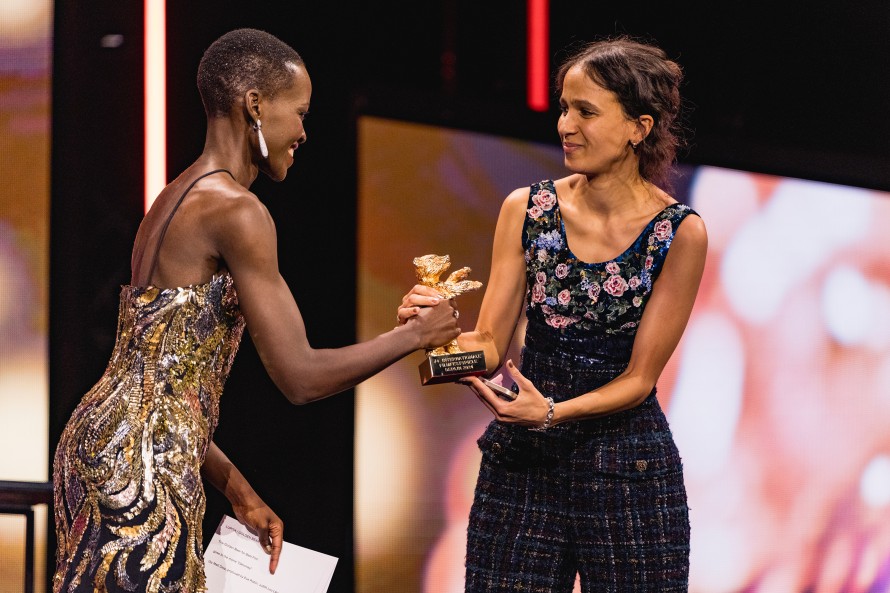
From woman to woman: Jury President Lupita Nyong'o presents the Golden Bear to director and producer Mati Diop
Of Bears and Hippos
The critics were almost unanimous in their assessment of the verdicts of the International Jury chaired by its president Lupita Nyong’o, the first black woman ever to hold this position. Mati Diop’s documentary Dahomey, dealing with the return to today’s Benin of art looted by the French colonialists, won the Golden Bear. While Andreas Busche saw the decision to award the main prize to a documentary for the second year running as an indication of the decline of the narrative feature film (“For the significance of narrative cinema […] – and thus for the significance of the Golden Bear – this is a worrying sign, even if the award is to be understood first and foremost as a political one” (“Der Tagesspiegel”, February 24, 2024)), for Guy Lodge, the choice absolutely followed the logic of the hyper-politicised zeitgeist: “The dominance of nonfiction cinema at this year’s edition, meanwhile, felt indicative of a restless mood in the industry, a reluctance to turn away from a world on fire to the comforts of escapism, as artists reckon with their platform and their privilege, and how best to use them” (“Variety” , February 24, 2024). With the exception of Daniel Kothenschulte – “In an average Competition, the jury recognised great individual achievements with a connoisseur’s eye” (“Berliner Zeitung”, February 26, 2024) – none of the critics were fully content. Robert Ide railed that “the decisions of the juries are once again the hardest to fathom” (“Der Tagesspiegel”, February 25, 2024) while Katja Nicodemus curtly asked in “Zeit”: “Really?” (February 24, 2024).
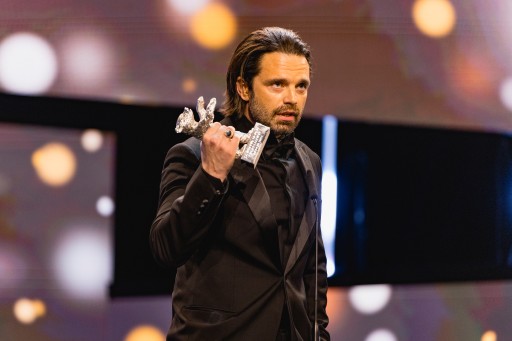
The first man to win one of the gender-neutral acting prizes: Sebastian Stan
Hong Sangsoo, a perennial guest at the Berlinale since Chatrian took over, was presented with his fourth Silver Bear (the 2024 Grand Jury Prize) in the last five years for Yeohaengjaui pilyo. The Silver Bear Jury Prize for Bruno Dumont’s L’Empire, a crude mixture of Godard’s Le Mèpris, Star Wars and Monty Python and the Holy Grail set in provincial northern France caused astonishment. The winner of the Silver Bear for Best Director also aroused surprise: in Nelson Carlos De Los Santos Arias’ essay film Pepe, a deceased hippo narrates in voiceover the story of his abduction. For the first time since their introduction in 2021, one of the gender-neutral acting prizes went to a man, Sebastian Stan (for his role in A Different Man directed by Aaron Schimberg), whereas the critics had once again in 2024 identified strong women to be favourites for the award: Liv Lisa Fries as a resistance fighter in Andreas Dresen’s In Liebe, Eure Hilde or Anja Plaschg who progressively loses her mind as the unhappily married Agnes in Veronika Franz and Severin Fiala’s Des Teufels Bad, a horror-portrait of 18th century rural Austria. Des Teufels Bad instead won the Silver Bear for Outstanding Artistic Contribution for its cinematography by Martin Gschlacht. Rounding off the winners of the 74th Berlinale, the Silver Bear for Best Supporting Performance went to Emily Watson for Small Things Like These while that for Best Screenplay was awarded to Matthias Glasner for his film Sterben. The fact that the critics’ favourite Keyke mahboobe man, whose directors Maryam Moghaddam and Behtash Sanaeeha were subject to a travel ban imposed by the Iranian government and therefore were unable to present their film in person in Berlin, came away completely empty-handed at the presentation of the Bears caused some astonished shaking of heads.
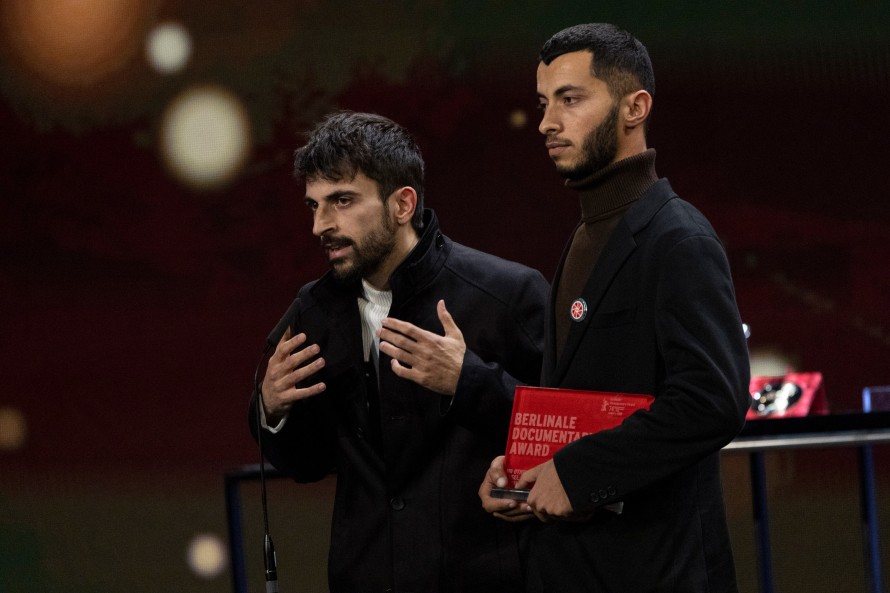
Straight from the heart: the two directors Yuval Abraham and Basel Adra accept the Berlinale Documentary Award for No Other Land
Accusations of Anti-Semitism
The words that created the big “scandal” that was to trouble the festival for weeks even after the awards ceremony and conjured up powerful headlines – “The anti-Semitic abysses at the Berlinale” (“Die Welt”, February 28, 2024), “The disgrace of Berlin” (“Süddeutsche Zeitung”, February 26, 2024) – had already been uttered even before the Bears were awarded.
It was clear even in the run-up to the festival that No Other Land, a disquieting documentary about the brutal methods employed in Israel’s settlement policy, could lead to sharp reactions in the heated atmosphere following October 7. Nonetheless, section head Michael Stütz made the decision – which in retrospect turned out to be wise and important – to include the film in the Panorama programme precisely because it explores the topic from the perspective of the people affected. The fact that the film was made by an Israeli-Palestinian directing collective, comprising Basel Adra, Hamdan Ballal, Yuval Abraham and Rachel Szor, played a significant role, as Stütz explained in an interview. It almost inevitably followed that the work, due to its close proximity to current political issues, won the Berlinale Documentary Award. Perhaps you had to have seen the film and its striking depiction of the suffering of the Palestinians to be able to put into perspective the words that were then spoken on the Berlinale Palast stage. Visibly upset, the Palestinian director Basel Adra revealed how difficult it was for him to be in Berlin while tens of thousands of his compatriots were being slaughtered and massacred by Israel. His Israeli co-director Yuval Abraham denounced the inequality in the West Bank and called for equal rights for Adra. Abraham spoke of “apartheid” which brought him a storm of outrage in some circles and even death threats.
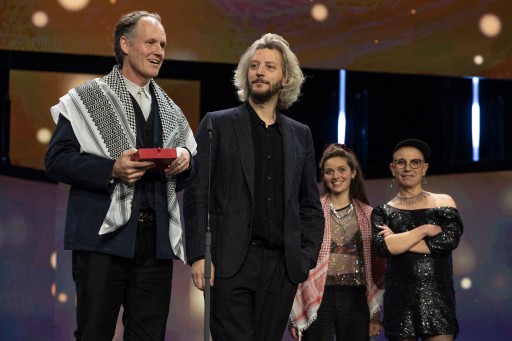
The keffiyeh could not be missed on stage: director Ben Russell and the team of DIRECT ACTION during their acceptance speech
The situation was aggravated when, upon the documentary DIRECT ACTION winning the Award for Best Film in the Encounters section, its American co-director Ben Russell, a keffiyeh wrapped around his shoulders, added at the end of his team’s acceptance speech: “And of course we’re here standing up for life, ceasefire now, we’re against, obviously, the genocide, we’re with all our comrades in solidarity.” As Nils Minkmar wrote in the “Süddeutsche Zeitung” on February 26, 2024: “By using the wrong terms genocide and apartheid, [the filmmakers’ statements] sounded like a shorthand for anti-Semitic propaganda. Nobody reacts, nobody forcefully contradicts them.” In the eyes of some critics, this lack of contradiction made the award ceremony a biased event. At the same time, however, the importance of allowing freedom of expression was also recognised, for example, by Hannah Pilarczyk: “Supporters of the misguided »Strike Germany« initiative would be well advised to watch this award ceremony. Their distorted image of a Germany in which pro-Palestinian voices are silenced at all costs and which therefore must be boycotted can no longer be maintained” (“Der Spiegel”, February 26, 2024).
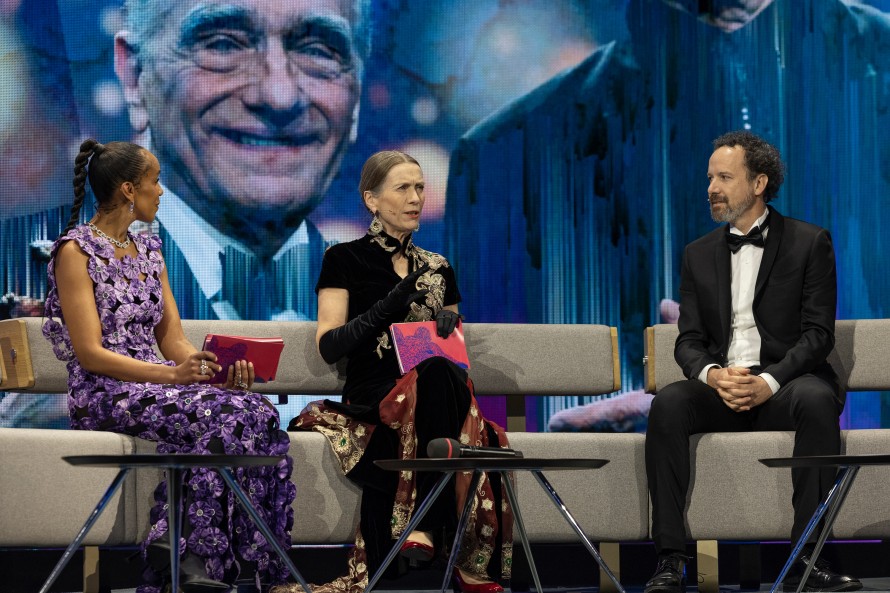
Moderator Hadnet Tesfai, Mariëtte Rissenbeek and Carlo Chatrian at the Award Ceremony in the Berlinale Palast
An incident on the Sunday after the award ceremony escalated the situation further: a post styled in the Berlinale look appeared on the Panorama Instagram page bearing the slogan “Free Palestine. From the River to the Sea.” – a criminal offence in Germany since it calls into question Israel’s right to exist. Although it was immediately deleted and the Berlinale filed a criminal complaint against unknown persons, the damage was done and those accusing the festival of anti-Semitism saw their opinion confirmed. And thus, the atmosphere which had been overheating for months reached a boiling point in the days following the festival. Some voices yelled blanket accusations about the Berlinale being an anti-Semitic event. Almost forensic attempts were made to analyse footage of the closing-night gala to determine who had clapped at which moments and how loudly. The media spectacle became more and more detached from the event itself. The festival management was accused of not having brought up often enough the Israeli hostages who were still being held captive by Hamas – in spite of the fact that Mariëtte Rissenbeek explicitly mentioned these hostages in her opening remarks and gave their suffering the same weight as the by that time already catastrophic humanitarian situation in a bomb-flattened Gaza Strip. In an interview, she judiciously explained: “The Berlinale stands for democracy and openness. […] The statements made by award winners are independent, individual opinions. They do not reflect the position of the festival in any way. As long as they remain within the limits of what is legal, we have to accept them. We understand the indignation caused by the fact that the statements made by some award winners have been perceived as too one-sided. But we as the Berlinale and as a society have to be able to bear these controversies” (“BZ-Berlin”, February 26, 2024).
The manner of allowing the films and their creators to speak for themselves and of making the Berlinale available as a platform – within the limits of the German constitution – was certainly met with appreciation: “In fact, the festival has recognised and made use of the signs of the times. Not only by once again clearly and yet subtly (there was no shouting) taking a position at its closing gala, but also by allowing art, which has become repoliticised in every aspect, to essentially speak for itself” (René Hamann, “taz”, February 25, 2024). In addition, many voices did not agree with the accusations of anti-Semitism, including Meron Mendel, director of the Anne Frank Educational Centre: “I would call them anti-Israel and one-sided statements, but not anti-Semitic rhetoric” (quoted in “Der Tagesspiegel”, February 27, 2024). Nevertheless, sections of the public media showed no willingness to differentiate or an openness for listening to opinions that do not correspond to their own.
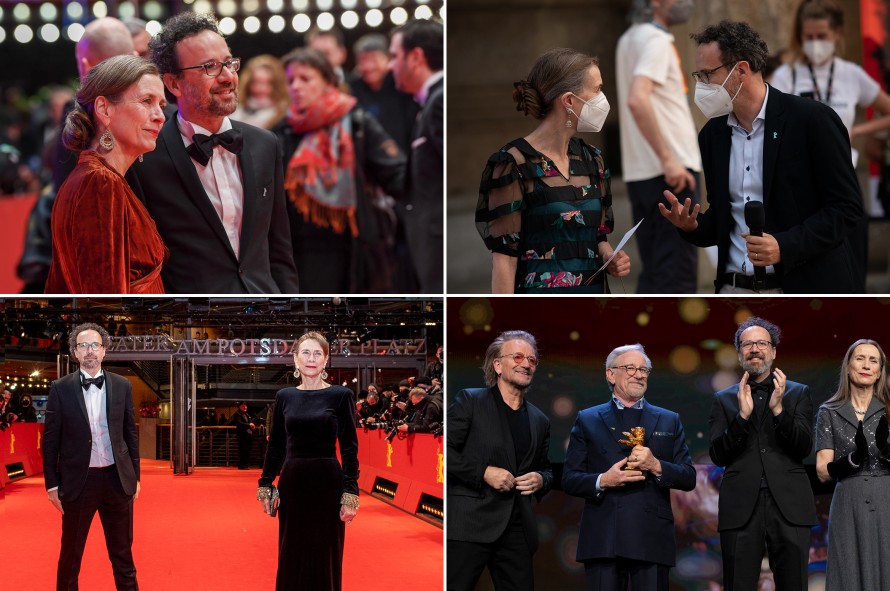
Scenes from a short era: Mariëtte Rissenbeek and Carlo Chatrian at their 2020 premiere, with masks during the Summer Special in 2021, with the prescribed distance in the second corona year in 2022 and in 2023 at the presentation of the Honorary Golden Bear with Steven Spielberg and his laudator Bono on the stage of the Berlinale Palast
The End of a Short Era
It would have been nice for the outgoing festival management to have been able to focus on the essentials in their final year: dedicating their attention to presenting films and celebrating cinema. But, once again, this remained a pious hope. Rissenbeek and Chatrian’s stewardship of the Berlinale through one of the most difficult phases in its history had not always been without friction. The revelations in 2020 of Alfred Bauer’s Nazi past were followed by two pandemic years which turned the festival completely on its head but which were still unable, however, to prevent it from being a success. In 2024, despite all the rows, the joint managers were once again able to successfully complete the edition, their final one. Their decisions were not always noncontroversial. Some voices criticised that the discontinuation of Perspektive Deutsches Kino and Berlinale Series and the rigid retention of the Encounters section did the festival more harm than good. In the eyes of some observers, Encounters weakened the profiles of Panorama and the Forum; in the eyes of others, it also damaged the Competition. As Katja Nicodemus and Thomas E. Schmidt observed: “It’s not easy to find 20 outstanding films for the Berlinale every year […]. Instead of concentrating on this task, Chatrian installed a second elaborate competition called “Encounters” alongside the proper one. The result: the two competitions cannibalised each other” (“Zeit”, February 28, 2024). Rissenbeek and Chatrian, too, were unable to resolve the critics’ almost automatic, perpetual naysaying. And they would pass on some of the structural problems to their successor: the budget concerns, the death of the cinemas around Potsdamer Platz and, as a consequence thereof, the lack of a true centre of the festival.
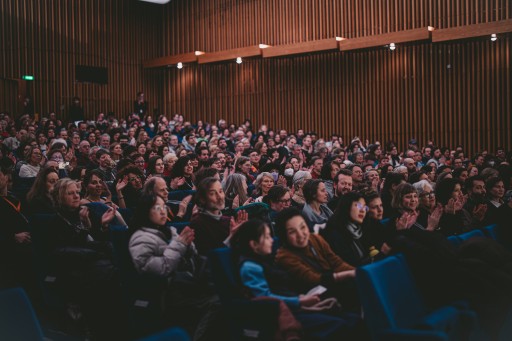
The rule, not the exception: packed auditoria like at the Kino International
But they were able to pass on their strongest trump card to Tricia Tuttle without any losses: the audience. Just under 330,000 tickets sold spoke for itself: the euphoria of the visitors and their enthusiasm, curiosity and passion for cinema and the Berlinale were unrestrained. Consequentially, Katja Nicodemus and Thomas E. Schmidt’s review and outlook were quite self-critical and optimistic: “The cinema as a place of dialogue turned out to be truly alive. And perhaps the evidently good-humoured new head can relieve us a little of the usual spirals of controversy, of provincialism, of our ritual nitpicking. The Berlinale needs no prescribed rulebook, no political threats, it needs a totally free hand for a reset" (“Zeit”, February 28, 2024).
Facts & Figures of the 2024 Berlinale
| Visitors | |
|---|---|
| Total amount of theatre visits | 447,655 |
| Tickets sold | 329,502 |
| Professionals | |
| Accredited guests (press excl.) | 17,297 |
| Countries of origin | 157 |
| Press | |
| Journalists | 2,671 |
| Countries of origin | 81 |
| Screenings | |
| Number of films in the public programme | 243 |
| Total amount of screenings | 884 |
| European Film Market | |
| Film industry participants | 9,245 |
| Number of films | 639 |
| Number of screenings | 998 |
| Stands / Offices | 234 |
| Number of exhibitors | 614 |
| Berlinale Co-Production Market | |
| Participants | 751 |
| Countries of origin | 70 |
| Berlinale Talents | |
| Participants | 196 |
| Countries of origin | 65 |
| Annual budget | €33 million |
| The Berlin International Film Festival receives €12.6 million in institutional funding from the Federal Government Commissioner for Culture and the Media. | |